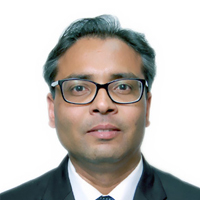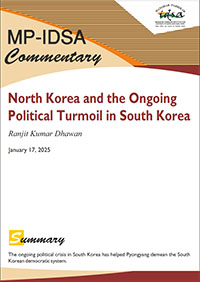North Korea and the Ongoing Political Turmoil in South Korea
- January 17, 2025 |
- IDSA Comments
Introduction
North Korea was regarded as one of the reasons for the sudden declaration of martial law in South Korea by President Yoon Suk Yeol on 3 December 2024.1 It was the first time in over four decades that martial law was imposed in South Korea.2 This move by President Yoon triggered a strong resentment from the South Korean public and the opposition parties. Subsequently, the legislative branch of South Korean political system, the National Assembly, passed a resolution against the imposition of martial law and nullified the presidential decree. The National Assembly also voted for the impeachment of President Yoon on 14 December 2024.3 However, the removal of Yoon from his post still requires approval from the Constitutional Court of South Korea.
Later, the National Assembly even impeached the acting President and Prime Minister Han Duck-soo. Remarkably, there was also a detention warrant against President Yoon which was approved by the Western District Court in Seoul for his role in the failed martial law imposition.4After several summonses to President Yoon, he was detained for interrogation by the South Korean Corruption Investigation Office for High-ranking Officials (CIO) on 15 January 2025.5 The ongoing political crisis in South Korea has raised concerns about its effects on the country’s relationship with the United States and Japan.6 Also, there are apprehensions that the North Korean regime may take advantage of the current political instability in South Korea.7
Origins of the Crisis
The democratic institutions in South Korea were largely built after its liberation from the Japanese colonial rule (1910–1945) and subsequent division of the Korean Peninsula by the Allied Powers in 1945. However, for almost four decades after the establishment of the Republic of Korea in 1948, the country remained under authoritarian regimes, both civilian as well as military. Notably, the authoritarian regime of Park Chung-hee (1961–1979) played a pivotal role in the rapid economic transformation of South Korea and its emergence as a capitalist ‘Asian Tiger’ economy.
The support for democratisation in South Korea emerged with the opposition of the masses against the authoritarian rulers, which was epitomised in the Gwangju uprising of 1980. The restoration of the democratic system in South Korea in late 1980s was a turning point in the modern history of the country and was regarded by Samuel P Huntington as the ‘third wave of democracy’.8 Since then the ‘democratic consolidation’ in South Korea had increased the status of the country in international affairs and contributed to building its national image.
The current political turmoil in South Korea has its roots in the intense rivalry between the two major ideological factions within the country, conservatives (posu) and progressives (chinbo).9 The conservatives have rightist inclination and are often regarded as pro-United States and pro-Japan. They support big business groups or chaebol, and demand North Korea’s democratisation. On the other hand, the progressive leaders expect more autonomy for South Korea in its alliance with the United States, and they have been more generous towards the North Korean regime. Progressives, also referred to as leftists, favour welfare measures, and support small and medium scale enterprises for employment generation.
The dominance of the opposition Democratic Party with progressive ideological inclination in the National Assembly had been troublesome for the leadership of President Yoon, who himself belongs to the conservative People Power Party. Apart from the deep ideological rivalry between the South Korean President and opposition lawmakers, the cases of scandals against the First Lady Kim Keon-hee had drastically lowered the approval ratings of Yoon in the country. Under these circumstances, President Yoon imposed martial law citing threats from the “anti-state forces and pro-North Korea followers” within South Korea.10 Interestingly, there have also been allegations that the South Korean military deliberately tried to induce North Korean provocations as an excuse for the imposition of the martial law.11
North Korea and the South Korean Domestic Politics
As a socialist country, North Korea shares more ideological commonalities with the South Korean progressives. Evidently, the progressive administrations in South Korea have shown more flexibility in dealing with the Kim dynasty regime in Pyongyang. In the past, only those South Korean presidents visited North Korea who belonged to progressive ideology. These include Kim Dae-jung (1998–2003), Roh Moo-hyun (2003–2008) and Moon Jae-in (2017–2022). The progressive administrations in South Korea have also been generous in providing various aid and assistance to North Korea.
However, the Yoon Suk Yeol administration since coming to power in 2022 had been hostile towards the Kim Jong-un regime in North Korea. As a response, North Korea began considering South Korea as an ‘enemy’ and a ‘separate country’ since 2024. Pyongyang has also been destroying all symbols related to the reunification of the Korean Peninsula as part of its ‘two hostile states’ policy. Since May 2024, North Korea has flown thousands of balloons carrying garbage towards South Korea in retaliation to the anti-Pyongyang propaganda leaflets sent by South Korean activists to this reclusive state. North Korean military also frequently jammed the GPS signals at the inter-Korean maritime borders. In November 2024, the ‘DPRK Institute of Enemy State Studies’ in North Korea published a white paper which was extremely critical about the policies of South Korean President Yoon Suk Yeol.12
In the wake of the present political crisis in South Korea, the North Korean state media remained silent on this issue for about a week. However, after a few days, news related to the martial law in South Korea appeared in the North Korean press and they mocked the South Korean political system.13 On the issue of impeachment of President Yoon, the North Korean media characterised its southern neighbour as a “politically paralyzed and socially chaotic” country.14 The news reported in North Korea about the ongoing South Korean political crisis was also apparently used to bolster support for the Kim dynasty regime in Pyongyang and were carefully edited to not show the relative prosperity in South Korea to the North Korean masses.15
Conclusion
The ongoing political situation in South Korea has raised serious concerns across the world. It has tarnished the image of South Korea as a stable democracy and has weakened the ‘soft power’ of the country. The current political turmoil in South Korea has also emboldened the Kim dynasty regime against the leadership in Seoul. Evidently, the North Korean authority, military, research institution and state media had been hostile towards South Korea. Paradoxically, the ongoing political crisis in South Korea has helped Pyongyang to demean the South Korean democratic system and gain legitimacy for the Kim dynasty regime from the North Korean public.
Views expressed are of the author and do not necessarily reflect the views of the Manohar Parrikar IDSA or of the Government of India.
- 1. “South Korea’s President Yoon Declares Emergency Martial Law”, Al Jazeera, 3 December 2024.
- 2. Jung Min-kyung, “South Korea Sees First Martial Law in Over 40 Years”, The Korea Herald, 3 December 2024.
- 3. Anna J. Park, “South Korea’s National Assembly Passes Impeachment Motion Against President Yoon Suk Yeol Over Martial Law”, The Korea Times, 14 December 2024.
- 4. Lee Soo-Jung and Michael Lee, “Court Approves Arrest Warrant for Yoon, First in Korean History”, Korea JoongAng Daily, 31 December 2024.
- 5. Yonhap, “Investigators Detain Yoon Over Martial Law Declaration”, The Korea Times, 15 January 2025.
- 6. Lee Hyo-jin, “South Korea’s Martial Law Turmoil Strains Alliance with US”, The Korea Times, 4 December 2024.
- 7. Yonhap, “Pentagon Warns ‘Any Actor’ Against Taking Advantage of Martial Law Turmoil in S. Korea”, The Korea Times, 12 December 2024.
- 8. Samuel P. Huntington, “Democracy’s Third Wave”, Journal of Democracy, Vol. 2, No. 2, Spring 1991, pp. 12–34.
- 9. Ham Chaibong, “The Two South Koreas: A House Divided”, The Washington Quarterly, Vol. 28, No. 3, Summer 2005, pp. 57–72.
- 10. Choi Jeong-yoon, “Why Did President Yoon Suk Yeol Resort to Martial Law?”, The Korea Herald, 4 December 2024.
- 11. Yonhap, “Defense Ministry Rejects As ‘Not True’ Claims That Military Induced N. Korea’s Provocations”, The Korea Times, 13 January 2025.
- 12. “White Paper of DPRK Institute of Enemy State Studies Betrays Criminal Colors and Miserable Plight of Puppet Yoon Suk Yeol”, KCNA, 3 November 2024.
- 13. Lee Si-jin, “North Korea Reports on South Korea’s Martial Law Turmoil For First Time”, The Korea Herald, 11 December 2024.
- 14. Yonhap, “NK Describes S. Korea as Politically Paralyzed, Chaotic After Yoon’s Impeachment”, The Korea Herald, 3 January 2025.
- 15. Ji Da-gyum, “N. Korea Reports S. Korean Unrest to Bolster Internal Solidarity: Seoul”, The Korea Herald, 12 December 2024.






